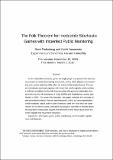| dc.contributor.author | Fudenberg, Drew | |
| dc.contributor.author | Yamamoto, Yuichi | |
| dc.date.accessioned | 2012-06-19T17:06:55Z | |
| dc.date.issued | 2011 | |
| dc.identifier.citation | Fudenberg, Drew, and Yuichi Yamamoto. 2011. The folk theorem for irreducible stochastic games with imperfect public monitoring. Journal of Economic Theory 146(4): 1664–1683. | en_US |
| dc.identifier.issn | 0022-0531 | en_US |
| dc.identifier.uri | http://nrs.harvard.edu/urn-3:HUL.InstRepos:8896226 | |
| dc.description.abstract | This paper introduces stochastic games with imperfect public signals. It provides a sufficient condition for the folk theorem when the game is irreducible, thus generalizing the results of Dutta (1995) and Fudenberg, Levine, and Maskin (1994). To do this, the paper extends the concept of self-generation (Abreu, Pearce, and Stacchetti, 1990) to “return generation,” which explicitly tracks actions and incentives until the next time the state returns to its current value, and asks that players not wish to deviate given the way their continuation payoffs from the time of this return depend on the public signals that have been observed. | en_US |
| dc.description.sponsorship | Economics | en_US |
| dc.language.iso | en_US | en_US |
| dc.publisher | Elsevier | en_US |
| dc.relation.isversionof | doi:10.1016/j.jet.2011.03.004 | en_US |
| dc.relation.hasversion | http://ssrn.com/abstract=1706269 | en_US |
| dash.license | OAP | |
| dc.subject | stochastic game | en_US |
| dc.subject | folk theorem | en_US |
| dc.subject | self-generation | en_US |
| dc.subject | return-generation | en_US |
| dc.subject | imperfect public monitoring | en_US |
| dc.title | The Folk Theorem for Irreducible Stochastic Games with Imperfect Public Monitoring | en_US |
| dc.type | Journal Article | en_US |
| dc.description.version | Author's Original | en_US |
| dc.relation.journal | Journal of Economic Theory | en_US |
| dash.depositing.author | Fudenberg, Drew | |
| dc.date.available | 2012-06-19T17:06:55Z | |
| dc.identifier.doi | 10.1016/j.jet.2011.03.004 | * |
| dash.contributor.affiliated | Fudenberg, Drew | |


